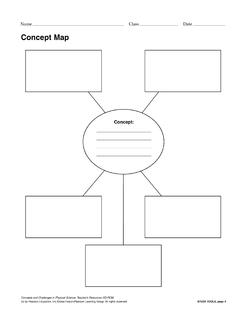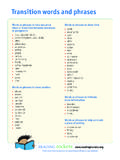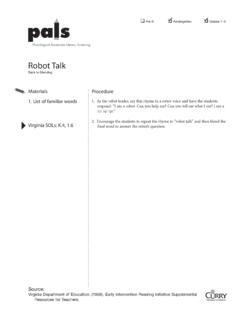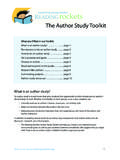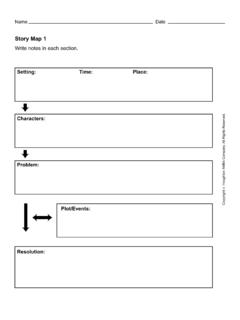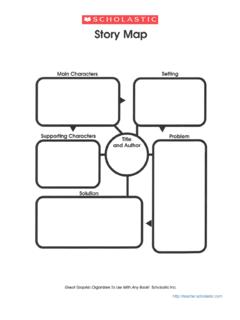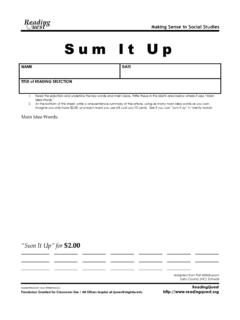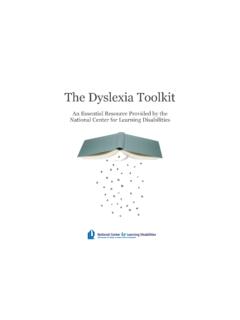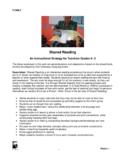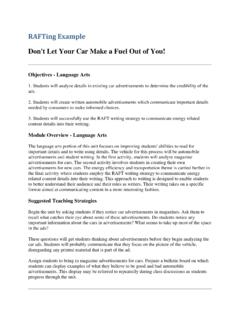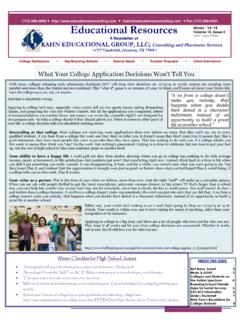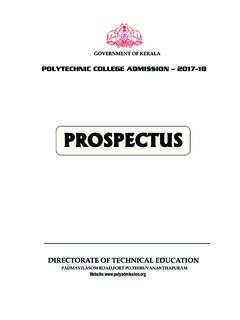Transcription of A collaborative project of - WETA
1 Reading Rockets and The Access Center are funded by the Department of Education, Office of Special EducationPrograms. Reading Rockets is a registered trademark of the problems a child may be having with reading, and target what you can do to help! Look inside for practical, research-based information for parents and teachers about: Phonological and Phonemic Awareness Word Decoding and Phonics Vocabulary Fluency Comprehension Other sources of reading difficultyThere are many reasons why reading can be hard. This handout describes the five components of reading and difficulties that kids experience within each area. We hope this tool helps you become aware of specific areas in which a child is having trouble and begin targeting ways to help. It s important to note that struggling readers will often have problems inmultiple areas.
2 For example, children who have problems with phonemicawareness almost always have problems in word decoding and phonics. The key thing is, don t hesitate when you suspect a child has a readingdifficulty. Trust your judgment and consider how a child does in comparison with other students. Parents play a huge role in making surethat their child s needs are being addressed by the school. Some kids end up being diagnosed with a learning disability. There is an even largergroup of students, though, who never receive a diagnosis but whononetheless need targeted assistance to learn and read well. Because youcare the most about your child, you need to understand your child s needsand advocate for him or her. A thorough reading evaluation can helpdetermine a child s reading difficulties.
3 Talk to the school about gettingan assessment done for your hope you ll use this information as a starting point! The best thingthat can happen is for parents, teachers, and other professionals to begin working together to help a child strengthen the skills that are socrucial to learning to Fine PrintPlease note that Target the Problem! is not intended to replace the expertise of trained professionals such as educational diagnosticians, school psychologists, special educators, or general educators in either diagnosing or instructing children who may have reading disabilities. Target the Problem! is also not intended to be exhaustive in scope. Pleaseuse the information provided in conjunction with information you may glean from otherresources and more information: free to photocopy and distribute this information if appropriate credit is given toReading Rockets, The Access Center, and LD Rockets| Access Center| OnLine| collaborative project | | this feels like to me I don t know any words that rhyme with cat.
4 What do you mean when you say what sounds are in the word brush? I m not sure how many syllables are in my name. What I can do to help myself Be willing to play word and sounds games with parents or teachers. Be patient with learning new information related to words and sounds. Giving the ears a workout is difficult! Practice hearing the individual sounds in may help to use plastic chips to represent each sound you hear in a I see at home She has difficulty thinking of rhyming words fora simple word like cat (such as rat or bat). He doesn't show interest in language play, wordgames, or I can do to help Do sound-related activities, such as helping yourchild think of a number of words that start with the /m/ or /ch/ sound, or other beginning sounds.
5 Make up silly sentences with words that beginwith the same sound, such as Nobody wasnice to Nancy s neighbor. Use computer games designed to build yourchild s phonemic skills. Read books with rhymes. Teach your childrhymes, short poems, and awarenessis a broad skill thatincludes identifying and manipulating largerunits of oral language parts such as words,syllables, onsets and rimes, and individualsounds (phonemes). Phonemic awarenessrefers to the ability tofocus on and manipulate individual sounds(phonemes) in spoken words. Acquiringphonemic awareness is important because it is the foundation for spelling and wordrecognition skills. Phonemic awareness is oneof the best predictors of how well childrenwill learn to read during the first two years of andPhonemic AwarenessWhat I see in the classroom She doesn t correctly complete blending activities; for example, putting together the-sounds /k/ /i/ /ck/ to make the word kick.
6 He doesn t correctly complete phoneme substitution activities; for example, changing the/m/ in mateto /cr/ in order to make crate. She has a hard time telling how many syllablesthere are in the word I can do to help Consider teaching phonological and phonemicskills in small groups since students will likely beat different levels of expertise. Make sure your school s reading program andother materials include skill building onphonemes, especially in kindergarten and firstgrade, and systematic instruction in this feels like to me I just seem to get stuck when I try to read a lot of the words in this chapter. Figuring out the words takes so much of my energy, I can t even think about what it means. I don t know how to sound out these words. What I can do to help myself Play with magnetic letters.
7 See how quickly you can put them in order while singing the alphabet song. Look at written materials around your house and at road signs to see if you can spot familiar words and letter patterns. Write notes, e-mails, and letters to your friends and family. Represent each sound you hear as you I see at home She often gets stuck on words when end up telling her many of the words. His reading is very slow because he spends somuch time figuring out words. She s not able to understand much about whatshe s read because she is so busy trying tosound out the I can do to help For a younger reader, help your child learn theletters and sounds of the alphabet. Occasionally point to letters and ask your child to name them. Encourage your child to write and spell notes,e-mails and letters using what he knows aboutsounds and letters.
8 Talk with your child about the irregular wordssuch as said,are, and wasthat he needs to recognize at sight. Decoding is the ability to apply your knowl-edge of letter-sound relationships, includingknowledge of letter patterns, to correctly pronounce written words. Understandingthese relationships gives children the abilityto recognize familiar words quickly and to figure out words they haven t seen before. Phonics is one approach to reading instructionthat teaches students the principles of letter-sound relationships, how to sound out words,and exceptions to the I see in the classroom She has difficulty matching sounds and letters,which can affect reading and spelling. He has trouble reading and spelling phonetically. She decodes in a very labored I can do to help Have students sort pictures and objects by the sound you re teaching.
9 Have children saythe letter-sound over and over again. Teach phonics in a systematic and explicit way,preferably in first grade. Use manipulatives to help teach letter-soundrelationships. These can include counters, soundboxes, and magnetic Decoding and | | this feels like to me I heard my friend tell what happened in the movie but I didn t really understand it. I feel like I just use the same words over and over again in my writing. I don t like to read on my own because I don t understand lots of the words in the book. What I can do to help myself Find books to read on your own. The more you read, the more new words you ll see, and the more you ll learn about the words. Look ahead in textbooks to learn newvocabulary and concepts before your teacher goes over the the section in class.
10 Keep a list of key vocabulary and transition words such asfirst, then, andfinally for I see at home She s unable to tell about her day in a way thatmakes sense. He doesn t link words from a book to similarwords from another book or real life. She misuses common I can do to help Engage your child in conversations every possible, include new and interesting words inyour conversation. Read to your child each day. When the bookcontains a new or interesting word, pause anddefine the word for your child. Help build word knowledge by classifying andgrouping objects or pictures while naming them. Play verbal games and tell jokes and refers to the words we must understand to communicate plays a fundamental role in thereading process, and contributes greatly to a reader s comprehension.
